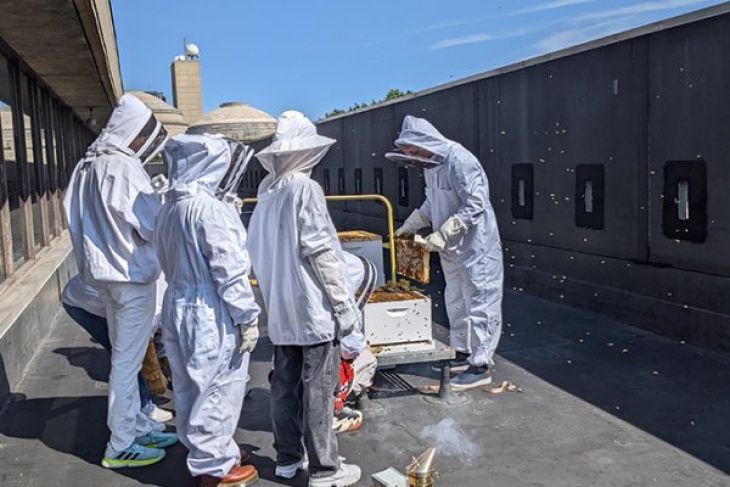Are you wary of bee stings? Maybe you are one of about 7.5 percent of Americans who, according to BeeAware, are severely allergic to insect venom? Even if you are bee-averse, it is important to remember that bees play a vital role in pollinating approximately one-third of our food supply. This includes more than 130 types of fruits, vegetables, and nuts. MIT’s Beekeepers Club, started in 2015, wants to “keep the buzz going” about the importance of bees while they tend to a hive on campus.
Club co-presidents Michael Gilbert, a graduate student in electrical engineering and computer science, and Fiona Lin, a senior in mechanical engineering, became interested in beekeeping by chance.
“I saw the beekeeper’s email on dormspam and invited a few people to check out the hive. I knew nothing about bees and was curious, so I went. It was such a novel experience and I was fascinated by the bees, so I remained interested in beekeeping,” says Lin.
Gilbert admits that Lin dragged him into beekeeping, but he is happy that she did. “The club went into hibernation during Covid. When we came back to campus, there was no hive. We decided we wanted to restart it, so we contacted some club alumni. With their help, we restarted the club. In a way, I learned about and became interested in beekeeping on the job,” says Gilbert.
As co-president and also treasurer, Lin is responsible for obtaining funding to buy supplies for the hive, organizing outreach events, and hosting hive checks. Gilbert has similar responsibilities, including purchasing supplies to maintain the hive.
The MIT hive is home to the western honey bee (Apis mellifera) but has not produced any honey as of press time. (It can take a year or more before a hive produces honey.) Both Gilbert and Lin say this does not detract from the importance of bees and their interest in keeping the hive and beekeeping alive on campus.
Both Lin and Gilbert say they have learned a lot about bees and beekeeping since joining the club. “Besides climate change, bees face a host of other challenges. The most serious challenges are Varroa mites and Nosema (a parasitic fungus). Improper pesticide use is also another serious concern. Though usually not a concern for a healthy hive, a bee probably won’t be happy to see a yellowjacket. Yellowjackets prey on bees, their larvae, and also steal honey and pollen from the hive. Then there’s also the inconsistent food source. Sometimes we have to supplement the colony, especially a young colony, with sugar syrup as an alternative food source,” says Gilbert.
Lin notes that sometimes wasps attack the bees and they keep an eye out for that when they check on the hive each week. Mites feed on bee larvae as well as adult bees in the hive. The feeding can cause a decline in bee pollinators and that reduces the pollination necessary for many fruits and vegetables.
“Bees are important pollinators. People rent hives to pollinate farms or gardens. I’ve read that shortage of bees is creating a substantial increase in pollinator rental costs for farms. This can drive up the cost of food. They also produce things we use directly, like honey and beeswax,” says Gilbert. “As beekeepers, we’re mostly stewards of the hive. We don’t feed them unless we have to, and our weekly hive check is just to make sure nothing bad is happening. We’ll inspect the hive, see how the bees are doing; do the occasional mite count, but nothing more,” says Gilbert.
“The bees take care of themselves and the hive. They feed themselves and they clean the hive — though their definition of ‘clean’ is different from ours. The hive may look dirty with all the propolis, a resin-like substance the bees put all over the hive to seal cracks and crevices, but the bees keep the hive sterile. Fun fact: The first thing a newly hatched bee does is go back and clean the cell it climbed out of,” says Gilbert.
Lin says, “We also have events outside of the hive! We host honey-tasting events, lip-balm events, and other fun bee-related things.”
Even if people are hesitant to have a beehive on their property, there are other things they can do to help sustain the bee population.
“One important issue is pesticide use. We’ve been thinking about starting a conversation with the Institute about the policy on pesticide use around campus. Unlike the case when raising other animals, keeping bees involves factors you can’t control by yourself. Bees gather nectar and pollen from flowers that grow in and around campus. We can’t control where they go to gather their food. It requires a community effort to make sure those food sources are safe for the bees,” says Gilbert.
“There’s no better way to teach folks about bees and their importance than showing them the real thing,” says Lin.
Future club members should not worry too much about being stung by the bees the club hosts. Lin has only been stung once, and so far, Gilbert has avoided a stinger entirely.
Students interested in learning more about the club can email [email protected] or visit the MIT Beekeepers website.














